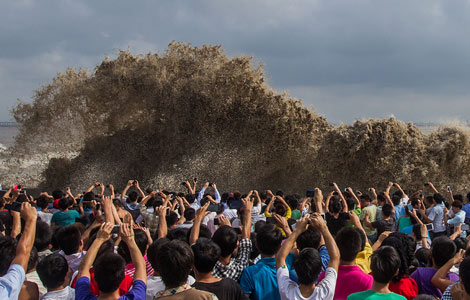Thailand sees no quick end to political impasse
Updated: 2013-12-24 14:13
(Xinhua)
|
|||||||||||
PRE- OR POST-ELECTION REFORM?
Suthep and other protest leaders insisted that "national reform " be made and that the February 2 election be immediately called off, though concrete objectives of the reform has remained a puzzle for people on the street who have joined the politician-driven putsch.
Yingluck was pressed to put off the election, for which a royal decree was already issued. The polls are legally required to be held within 60 days following the dissolution of parliament under the laws of Thailand.
"Let's skip any rule or article of the constitution which might stand in the way of the national reform. Do not deny people's demands or else the country might be thrown into anarchy. The primary duty of the government is to maintain peace and not trigger civil war," said former House speaker Uthai Pimchaichon.
Nevertheless, other academics as well as Pheu Thai Party members argued that the reform should only follow the election so that a majority of 48 million eligible voters nationwide will decide for themselves who will be picked to carry out the reform in the first place.
Meanwhile, acting Foreign Minister Surapong Tovichakchaikul, who currently heads the government-installed Center for Administration of Peace and Order, advised all parties to abide by the rule of law and expressed support for the election.
"Election is accepted by the world community as a peaceful approach to end political conflict. Unelected government will not be recognized anywhere in the world as long as democratic rule is concerned," he said.
POSSIBLE THERAPY
Following a few days of stand-offs between policemen and protesters outside Government House and elsewhere in Bangkok, members of the military top brass arranged a meeting between Yingluck and Suthep at an army barracks on December 2 which failed to produce any results.
Acting as a peacemaker, the military's top brass on December 14 hosted a brainstorming forum of academics and members of state agencies to seek ways to resolve the deep-rooted political crisis.
"The military are strictly obliged to perform the assigned duties and respect the rule of law. We support all efforts to solve the conflict in peaceful fashion...Of course, the election will be held as scheduled," pledged Supreme Commander Gen Thanasak Patimapakorn at the end of the seminar.
Yet, many doubt that the February 2 election will ever take place as the street protesters look so determined to call it off, regardless of the military leaders'verbal assurances.
Some analysts believed that the government must find a fundamental solution to the conflicts between middle-class and grassroots constituencies to help end the vicious circle of street politics.
One of the priorities, they noted, is to set up a political system with check and balance and to combat corruption and address earnestly the appeal of all social sectors.
In addition, they proposed that the government should carry out economic restructuring to enhance the nation's competitiveness so that the government could offer a bigger cake for all social sectors to share.
Equally important, they argue, reforms should be to made to ensure fair distribution of social wealth to narrow the gap between the rich and the poor.
Related Stories
Thai protesters disrupt candidates 2013-12-24 07:16
Protesters swarm in Bangkok to demand PM resign 2013-12-23 11:16
Thai rallies maintain pressure 2013-12-23 07:27
Thai opposition party to boycott election 2013-12-21 19:25
Thai political turmoil raises int'l concerns 2013-12-18 19:01
Protesters in Thailand want a year for reform 2013-12-14 07:59
Today's Top News
China's top 10 scandals in 2013
Chinese merchant killed during robbery in Russia
Private clubs are targeted by anti-graft campaign
US tries to shift spying blame
China makes it easier to sue government
Lawmakers near to ending laojiao
Policies to assist those who lost child
China's moon rover flexes muscles
Hot Topics
Lunar probe , China growth forecasts, Emission rules get tougher, China seen through 'colored lens', International board,
Editor's Picks

|

|

|

|

|

|





